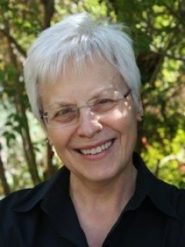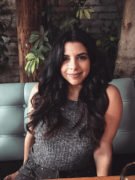Eloise Klein Healy, Poet
‘A Totally Wild Idea’: The Writing and Realms of Eloise Klein Healy
 On a sunny September day in Sherman Oaks, California, a gray Portuguese water dog greeted me at the door of prolific poet and publisher Eloise Klein Healy. If it’s all right, I have some things to show you, Healy said as she led me through a Zenned-out garden to her private work studio at the back of the property.
On a sunny September day in Sherman Oaks, California, a gray Portuguese water dog greeted me at the door of prolific poet and publisher Eloise Klein Healy. If it’s all right, I have some things to show you, Healy said as she led me through a Zenned-out garden to her private work studio at the back of the property.
Her office is every writer’s dream: a shaded sanctuary with paintings on the wall, volumes of Walt Whitman and Gertrude Stein, wooden desks, a blue lounging couch, black-and-white photographs, and, most generously, the artworks and postcards of friends, which she has preserved in dainty boxes and picture frames. Safe to say the only tweeting that goes on here belongs to the birds outside her window.
At seventy-four, Healy has a twinkle in her eye when our conversation steers her memory toward a line in a poem, and she knows precisely the page, precisely the book. Isn’t that amazing? she exclaims, sliding her finger across the words. Her enthusiasm is contagious, and at this point my cheeks hurt from smiling. Among her treasures: poetry fortune cookies—handmade and gifted to her by a friend, a framed broadside printed by Beyond Baroque, and a first edition of The Velveteen Rabbit.
We had already spent nearly an hour together before I realized I hadn’t asked her any questions yet. In a way, I had sensed she would tell me just about everything I wanted to know before I stood a chance to ask. That’s what it’s like to spend time with Eloise—it feels cosmic, psychic. Her zest for life and abundant gratitude for her career permeates from her smile. I had intended to ask her what she believes makes a successful writer. I got my answer anyway: curiosity.
“I ask any question to anybody,” Healy told me. “What I learned about from being alive is, I think I just learned to go and see.”
Healy the Poet
Asked to name her poetry lineage, the keywords are “healthy” and “wild.”
“I like Robert Frost,” Healy said, noting the famous poem, “The Road Not Taken.”
That’s what it’s like to spend time with Eloise—it feels cosmic, psychic. Her zest for life and abundant gratitude for her career permeates from her smile.
“It was really about this man who was… talking about walking, and talking about trees, and talking about plants, and being in connection with others,” she said. “It’s all about him becoming a very healthy, a very happy-making person.”
“I also include over here [gesturing to a frame on the wall] Adrienne Rich, totally! I have every book, every everything that’s ever been there… Because I found her incredibly healthy,” Healy said. “In her mind, healthy. She had also decided to not be married anymore. And she continued to make herself brave. That’s at a point [in time] in which it was brave. Because instead of having a thousand things [out] there about lesbian women, there were [only] a few.”
Anyone else? I waited.
“Walt Whitman,” Healy replied. “We could always stick in Allan Ginsburg, because he was a totally a wild idea, and so was Elizabeth Bishop.”
Directed by Feeling
When it comes to craft, Healy’s process is innate, directed by senses, intuition and experience.
“I think there is really an ability to know what feeling is like, and how much of what I’m doing is managed and directed and how much of it is all about feeling,” Healy said. “I have a lot of emotional ability to look at things… Sometimes I feel the world is too filled with importance and information.”
On her iMac, Healy showed me neat folders containing poems for her next books, arranged by collection. Each poem file featured all the previous drafts archived below, so scrolling through the document she could observe the changes each poem had undergone in revision. I made a mental note to steal this technique.
As for her current reading list—it’s long. While she always reads Poets & Writers and Harpers, at the time of my visit she was most excited about The Ministry of Utmost Happiness, a novel by Arundhati Roy, and Layli Long Soldier’s Whereas.
“She’s so different in the language that she chooses,” Healy said, calling Soldier’s work one of her current favorites.
“So the teacher jumped on the desk”
We spoke about the twentieth anniversary of the Antioch University Los Angeles MFA program, which she helped to establish as the founding chair in 1997. Under Healy’s leadership, it was determined that the program would operate under the low-residency model, with mentorship and collaboration at the forefront.
“I first discovered that Antioch was interested in talking to me because they knew that I was doing very well at Cal State Northridge,” Healy said. “But I was feeling like I really wanted to try another way to do things, and not just have somebody stand over here and say, ‘Do this!’”
‘I wanted to make sure that every one of us would be able to talk back and forth, which to me was very important because some people are afraid.’
Healy envisioned an academic model that privileged participation and inclusion.
“I found that I had a lot of experience with others… I wanted to make sure that every one of us would be able to talk back and forth, which to me was very important because some people are afraid,” Healy recalled. “I really wanted to make it feel like we were going to work on something.”
Healy’s career as an educator far predates AULA, and I was elated when she confirmed the story behind one of my favorite poems from The Islands Project (2007), “So the Teacher Jumped on the Desk.”
“It was true,” Healy said. “That was really a nice piece that let itself just happen.”
The poem retells an incident from her time as a student at Immaculate Heart, where she would eventually go on to join the faculty. The poem challenges the expectations of a typical “middle class Catholic girl”:
you are NOT going to make
Jell-O molds & tat doilies, you are going
to smoke a lot of dope & waste the weekends
drinking gallons of Gallo Hearty Burgundy
shirtless on the patio and you won’t be alone
“This was a big experience,” Healy said. “I can see the face of that man with his tie flying through the air as he jumped up on the desk and waving the book Howl.”
Activist in Echo Park
Healy’s identity as a feminist is at the core of her writing and activism. She shared her experience of this year’s post-inaugural Women’s March. “Literally, the whole Los Angeles downtown was packed with people,” she said excitedly. “I just took pictures of people. They weren’t my friends, they weren’t people I knew, but there they were. Not only including grown-up people, but little children, and moms and dads pushing [strollers]… People were starting to sing.”
Her advice to people who want to join?
“Just be there. Just be there. Open up to everyone,” she said. “That was a major event of not only getting information, but of creating happiness.”
“They love what they’re doing, they want to be involved. It was great. I’m still trying to do that again,” Healy said, alluding to her recovery from aphasia, a condition that affects a person’s ability to communicate. “Even though I lost my brain and my language, I am spending a lot of time trying to rebuild it with these poems… I’m happy to be alive, you know?… I feel so lucky that really good parts of me still work.”

 Jessica Abughattas is a Palestinian American poet. She is an MFA candidate at Antioch University, and associate managing editor of Lunch Ticket. Her poems appear in THRUSH Poetry Journal, Stirring Lit, Heavy Feather Review, Drunk in a Midnight Choir, Roanoke Review, Rogue Agent Journal and elsewhere.
Jessica Abughattas is a Palestinian American poet. She is an MFA candidate at Antioch University, and associate managing editor of Lunch Ticket. Her poems appear in THRUSH Poetry Journal, Stirring Lit, Heavy Feather Review, Drunk in a Midnight Choir, Roanoke Review, Rogue Agent Journal and elsewhere.


